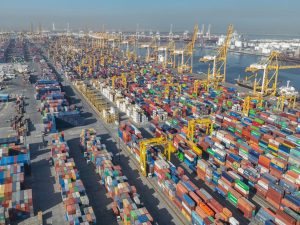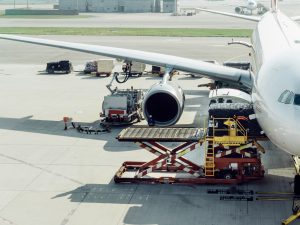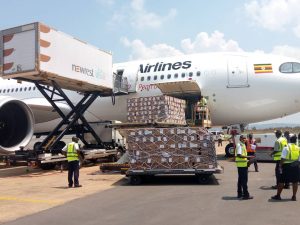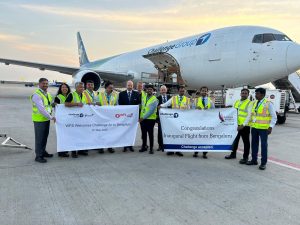Pharma.Aero and TIACA have partnered on the Food and Farm for Health project to underscore the economic value and the dual role of air cargo in healthcare access and economic development in low and middle-income countries. Strategically developed in collaboration with CCA (The Cool Chain Association) and HLA (The Humanitarian Logistics Association, the project seeks to optimize air cargo’s potential to deliver life-saving medicines while simultaneously supporting local agricultural economies. Frank Van Gelder, Secretary General of Pharma.Aero said, “The Food and Farm for Health Project is about leveraging air cargo to address two critical needs in low- and middle-income countries: healthcare access and economic empowerment. We, at Pharma.Aero, recognized a critical gap and initiated this project to use air cargo as a dual-purpose tool: flying in life-saving pharmaceuticals and medical supplies while flying out perishable agricultural products—like fruits, vegetables, and flowers—from local farmers to Western markets. By utilising available cargo space on return flights, we create a more cost-effective, efficient trade route. This approach not only ensures faster access to essential medicines and vaccines, but also opens new market opportunities for farmers, boosting local economies and providing better access to international markets”, said Van Gelder. “Air cargo is more than a mode of transport — it’s a critical lifeline for economies and communities across the globe”commented Steven Polmans, Chair of TIACA. “The completion of our Global Market Evolution Analysis marks a major milestone in understanding how perishable goods and pharmaceuticals move, especially in regions where access means everything. From Kenya’s flower exports supporting millions of jobs to India’s seafood sector driving billions in trade, our work confirms that airfreight is a catalyst for opportunity, health, and resilience. As TIACA, we’re …
Read More »India, UK signs massive trade deals, cuts tariffs, boost growth
India and Britain struck a ‘landmark’ trade deal marking progress on lowering and removing tariffs, said UK government in official press release. United Kingdom has secured much-awaited trade deal with India. The two nations’ agreement is “the biggest and most economically significant bilateral trade deal the UK has done since leaving the EU,” the UK Department for Business and Trade said in a press release. As a result of the agreement, it noted, bilateral trade is expected to swell by £25.5 billion ($34.1 billion) per year in the long run. That would be a 60% increase from the 2024 level, based on UK government data. India has agreed to reduce tariffs on a range of UK products, including whisky, medical devices, advanced machinery and lamb. And most of these levies will be removed altogether within a decade, according to the release. In turn, the United Kingdom will lower tariffs on Indian goods, the business and trade department suggested, without providing details. “British shoppers could see cheaper prices and more choice on products including clothes, footwear and food products, including frozen prawns, as (the) UK liberalizes tariffs,” the release said.
Read More »‘Congestion, limited aircraft parking capacity & airside delays crucial bottlenecks’
Keku Bomi Gazder, MD & CEO, Aviapro Logistic said, “Prime airports like IGI Airport handle nearly 2 million metric tons of cargo annually, and Mumbai’s Chhatrapati Shivaji Maharaj International Airport faces severe congestion due to surging passenger and cargo traffic. The dual increase leads to severe congestion, characterised by slot limitations impacting approximately 30% of freighters, limited aircraft parking capacity, and airside delays, eventually contributing to direct delay of over 4–6 hours in cargo offloading and a 20-25% increase in freighter turnaround times. Despite ongoing infrastructure upgrades, cargo terminals at key hubs are operating at 85–90% of their peak capacity, leaving little room to accommodate seasonal surges such as e-commerce spikes during Diwali, which can drive volumes up by as much as 40%. High-value, time-sensitive shipments further strain already stretched facilities. Remarkable gaps persist in critical areas, with only around 15% of terminals equipped with adequate temperature-controlled infrastructure for pharmaceutical handling, dedicated e-commerce processing zones remain limited, and automation adoption is low, with just 25% of cargo operations automated, contributing to operational inefficiencies and processing delays.”
Read More »Jafza celebrates 40 years of trade between India & UAE
The Jebel Ali Free Zone (Jafza) is marking its 40th anniversary with record trade growth between India and the UAE, supported by strategic initiatives and infrastructure that connect Indian businesses to global markets. In 2024 alone, DP World’s flagship free zone, saw a 40% rise in trade volume and a 17% rise in trade value from India compared to the year before. Today, more than 2,300 Indian companies operate from Jafza, employing over 15,000 people across core sectors including electronics, construction, food, chemicals, and logistics. Indian businesses represent the largest community in the free zone by trade volume. Last year, Jafza welcomed 283 new Indian companies, marking a 15% year-on-year increase in new registrations and highlighting the strength of the India-UAE trade corridor and the growing demand for Dubai’s multimodal trade infrastructure and strategic connectivity. His Excellency Sultan Ahmed bin Sulayem, Group Chairman & CEO, DP World, said: “India has been instrumental to Jafza’s story over the past four decades. Our collaboration has gone beyond trade to create a lasting partnership based on trust, opportunity, and mutual progress. India and the UAE aim to reach $100 billion in non-oil trade by 2030, and Jebel Ali’s ecosystem will be a key driver in achieving this milestone. As we look ahead, we remain committed to supporting India’s global ambitions through our network of smart logistics solutions.”
Read More »Air cargo freight rates continue to decline in April: Xeneta
Air cargo freight rate improvements continued to narrow in April amid weakening demand, geopolitical tariff tensions and a drop in jet fuel prices. While global air cargo volumes grew 4% year on year in April, global air cargo spot rates rose just 3% year on year, a second consecutive month of only a single-digit increase, said Xeneta, and a continuation of a narrowing of the growth rate. Rates were up 17% in January, 10% in February and 6% in March. “This slowdown aligns with weaker demand trends. Adding to the downward pressure on rates, jet fuel prices fell -24% year-on-year in the first three weeks of April,” said Xeneta. “This drop, driven by ongoing economic and geopolitical uncertainties, likely played a role in tempering overall spot rate growth.”
Read More »Konkan mangoes exported via cargo hub at MOPA
The Air Cargo Logistics Hub at Manohar International Airport (MOPA) has started export of mangoes from Konkan region. As per reports, a shipment containing 3386 kg of Alphonso mangoes was sent to Sharjah via Air Arabia flight. 600 kgs of mangoes are expected to be exported at Europe and UAE in the coming months.
Read More »Vietnam Airlines, Challenge Group begin freighters from BLR Airport
Giving a boost to Indian air cargo, and trusting its in capabilities, both Vietnam Airlines and Challenge Group have started their cargo operations recently from Bangalore Airport, with Worldwide Flight Services (WFS) and AISATS as their cargo handling and ground handling partners respectively. Vietnam Airlines will operate four weekly flights from BLR Airport to Hanoi International Airport, while Challenge Group will operate one weekly freighter services from BLR Airport.
Read More »‘Responsible sourcing, minimised environmental impact & supporting local communities will drive growth’
Smitha Shetty –Regional Director APAC– Achilles Information said, “Industries are prioritising innovation in extraction, processing and recycling technologies. Crucially, the focus is shifting towards sustainable practices and ESG considerations. This includes responsible sourcing, minimising environmental impact and supporting local communities. The long-term growth of the commodities sector will depend on our collective ability to balance economic development with environmental stewardship and social responsibility.”
Read More »‘Govt, industry must invest in R&D to ensure long-term sustainable growth’
Kavitha Suresh, AGM – Crown Workspace & Warehousing, said, “Governments and industries focus on the 4 ‘I’s – Information, Insight, Influence, and Impact – before making investments is crucial. They are investing in R&D to ensure long-term sustainable growth and improve infrastructure for smooth business operations. Long-term joint ventures are formed to secure stable investments and fuel growth. Additionally, training programs are pivotal for organisational growth, ensuring a skilled workforce. Investment in technology is crucial for long-term growth. Regulatory support, which encourages sustainable practices, investment in green technologies, and provides tax incentives and subsidies, also plays a significant role in ensuring long-term growth.”
Read More »‘Increasing pressure on air cargo to adopt SAF, but it’s still developing & costly’
Malcolm D’souza, Director Airfreight and Member of the Management Board, Jeena & Company said, “There is increasing pressure on the air cargo sector to meet stricter environmental standards, especially as governments adopt more stringent emission reduction targets. Air cargo companies are under pressure to reduce their carbon footprint, which may involve investing in cleaner technologies like sustainable aviation fuel (SAF), but these technologies are still developing and costly to implement. Although some segments of the air cargo industry have adopted digital technologies, many areas remain outdated. For example, paper-based documentation, manual data entry, and lack of integration across platforms still slow down operations. Automation, predictive analytics and blockchain solutions could streamline operations, but not all players are on the cutting edge of adopting these technologies.”
Read More » Cargo Breaking News
Cargo Breaking News









